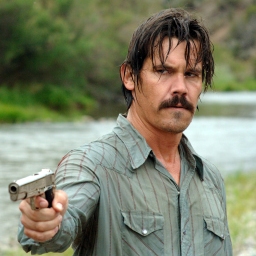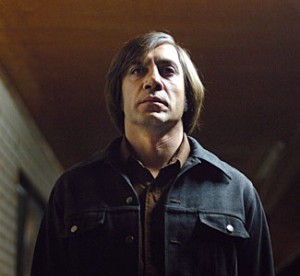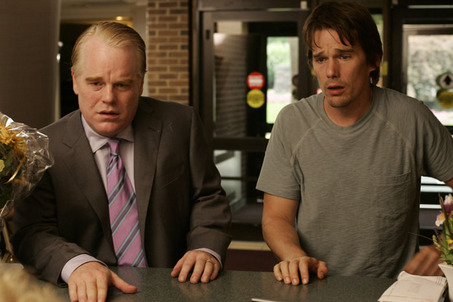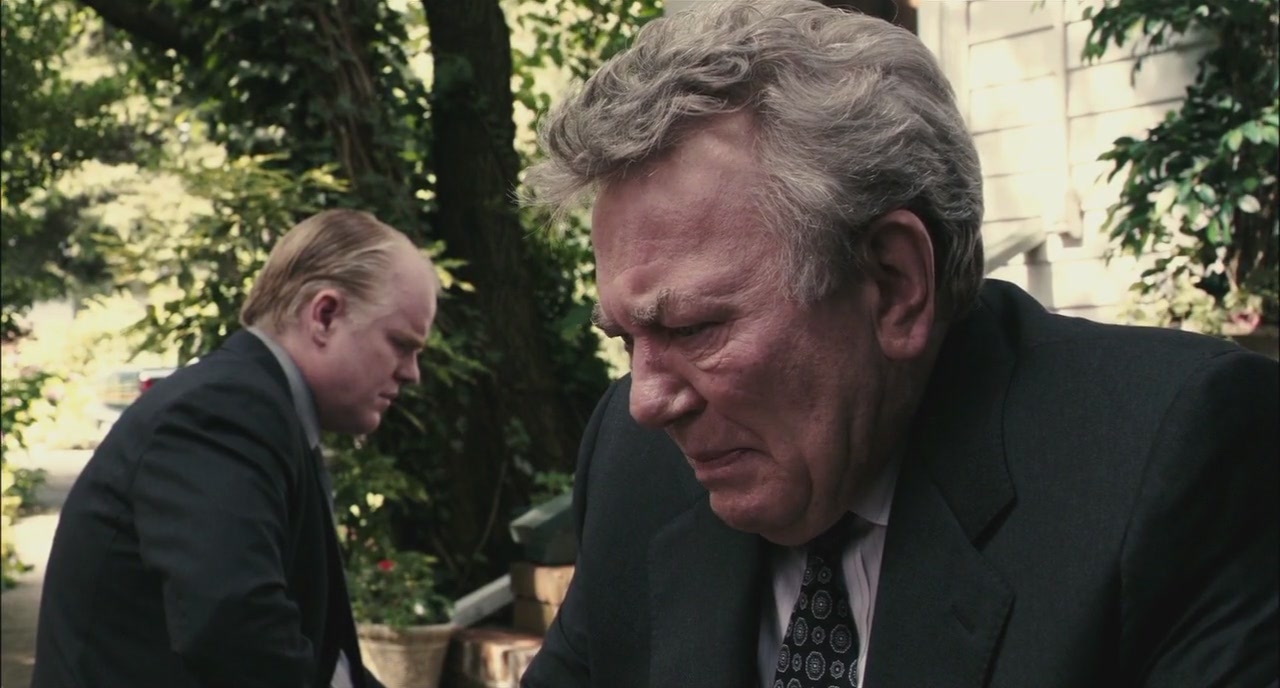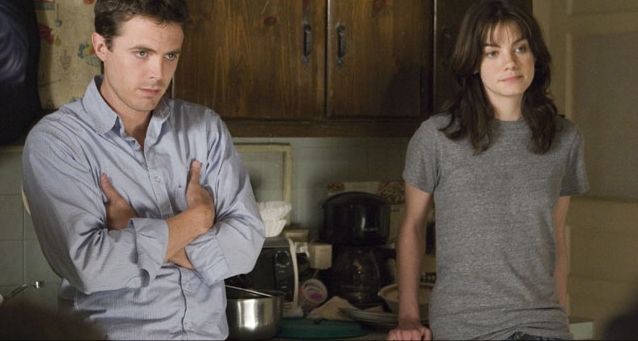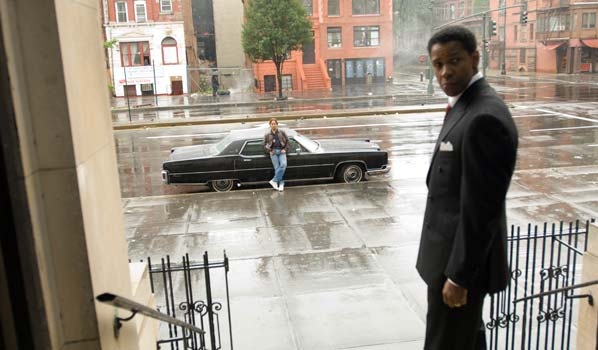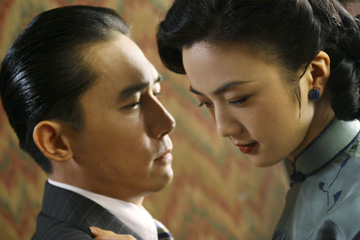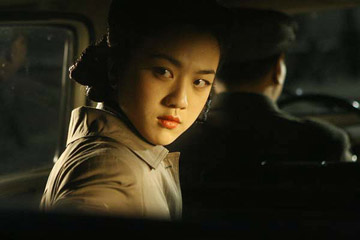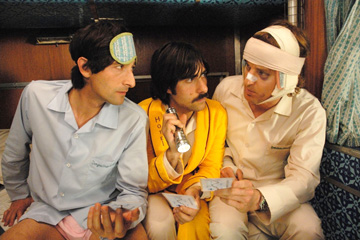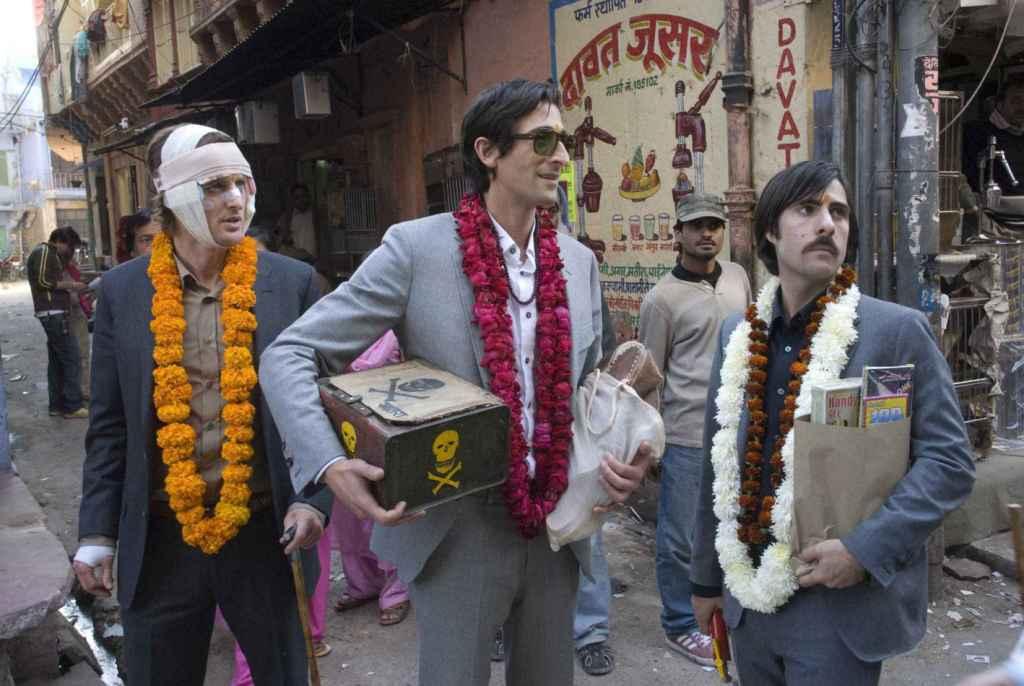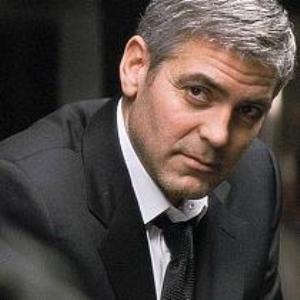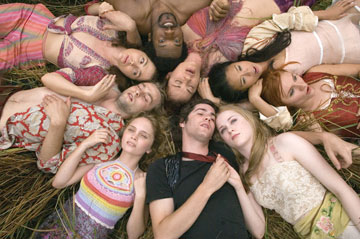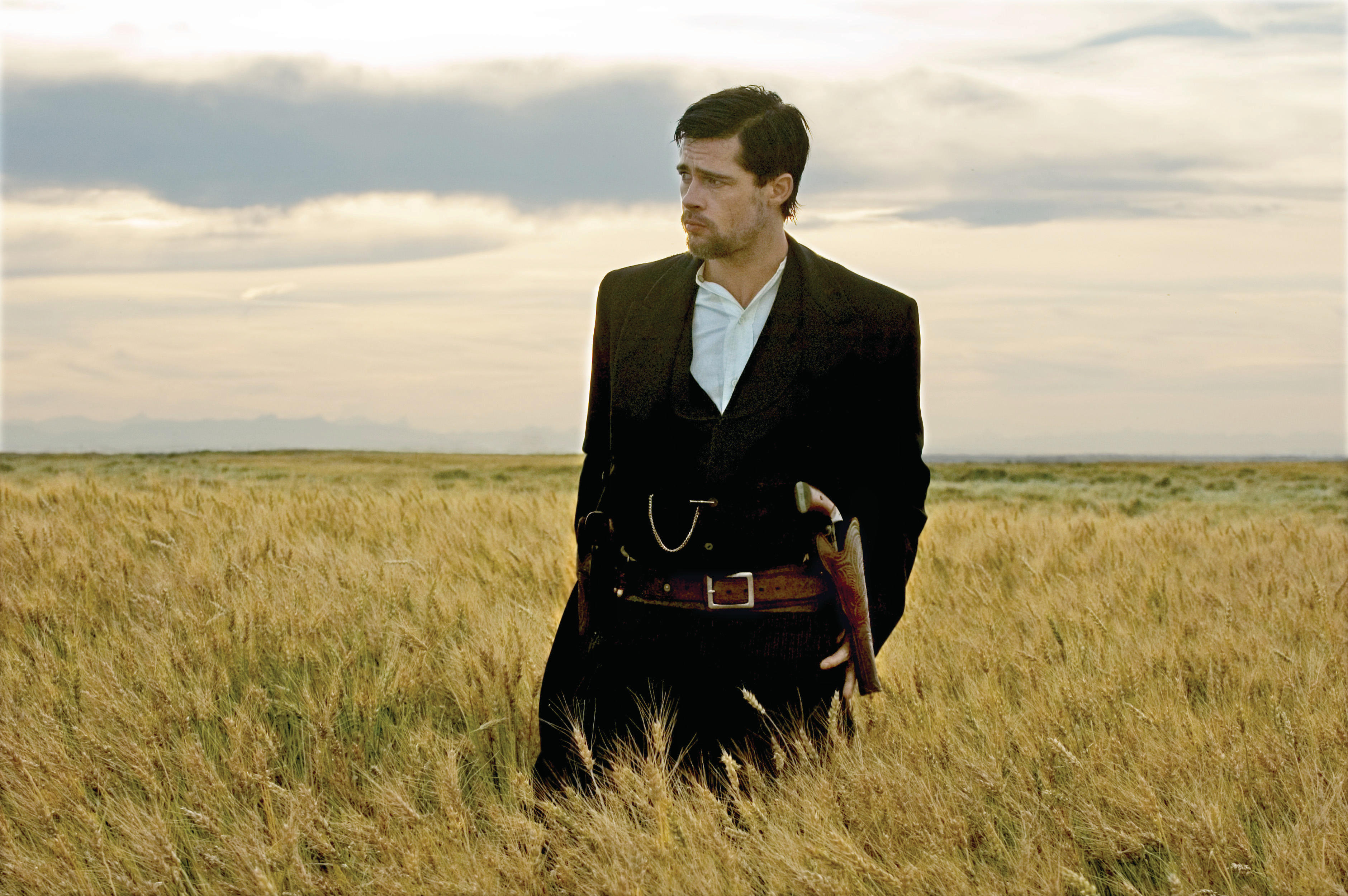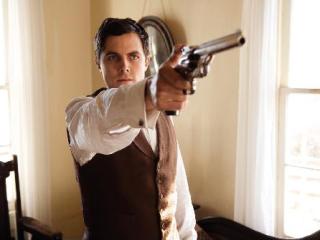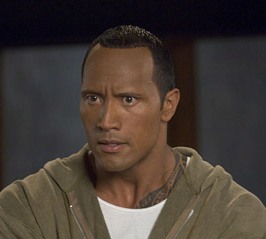 Well, I guess nobody can doubt its commitment to Sparkle Motion. But, sadly, the sprawling, incoherent Southland Tales, the second film by Donnie Darko creator Richard Kelly, is a ghastly trainwreck, and easily the worst film I’ve seen in a theater since 2003’s Gods and Generals. As I said to my brother on the way out (and as David Edelstein also noted), it makes the excellent Donnie Darko look worse in retrospect (and goes a long way toward explaining why the needlessly expository Darko Director’s Cut is so much less satisfying than the original version.) A hackneyed, overwrought stoner mishmash of leaden political satire and borrowed apocalyptic sci-fi influences, Southland Tales is so terrible I left the theater irritated that it even got made. It’s not so-bad-its-good…it’s just bad. Really, how does a movie this lousy get filmed? How do the actors and everyone else involved not see they’re in the midst of a disaster? And why didn’t marginally more talented folks like Kevin Smith or Eli Roth take a break from their oh-so-cutesy cameos and give their boy a heads-up? As it is, Southland Tales basically feels like something composed in the back of a high school notebook, amid album cover doodles and lyrics about being misunderstood, after a long night at the bong.
Well, I guess nobody can doubt its commitment to Sparkle Motion. But, sadly, the sprawling, incoherent Southland Tales, the second film by Donnie Darko creator Richard Kelly, is a ghastly trainwreck, and easily the worst film I’ve seen in a theater since 2003’s Gods and Generals. As I said to my brother on the way out (and as David Edelstein also noted), it makes the excellent Donnie Darko look worse in retrospect (and goes a long way toward explaining why the needlessly expository Darko Director’s Cut is so much less satisfying than the original version.) A hackneyed, overwrought stoner mishmash of leaden political satire and borrowed apocalyptic sci-fi influences, Southland Tales is so terrible I left the theater irritated that it even got made. It’s not so-bad-its-good…it’s just bad. Really, how does a movie this lousy get filmed? How do the actors and everyone else involved not see they’re in the midst of a disaster? And why didn’t marginally more talented folks like Kevin Smith or Eli Roth take a break from their oh-so-cutesy cameos and give their boy a heads-up? As it is, Southland Tales basically feels like something composed in the back of a high school notebook, amid album cover doodles and lyrics about being misunderstood, after a long night at the bong.
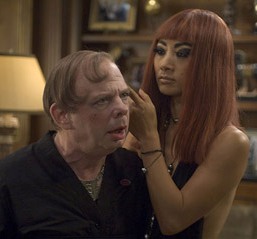 As Southland Tales begins in the near-future of 2005 (which should give you a sense of how long this film was stuck in development hell), a family barbeque in Abilene, Texas is disrupted by nuclear devastation, and WW3 begins in earnest. As then explained in voiceover by a disfigured Iraq vet (Justin Timberlake) over an impressive infotainment presentation (probably the best thing about the film), the US is now at war with Dubya’s entire Axis of Evil (and Syria to boot); the world is facing a global oil shortage which may be alleviated by a newly-created hydrothermal energy source known as Fluid Karma; the Department of Homeland Security has taken NSA wiretaps to the next level and fashioned an Orwellian nightmare known as USIdent; “Neo-Marxist” (really?) cells have sprung up around Venice Beach, CA to fight Big Brother; and the crucially important election of 2008 pits the staid Democratic ticket of Clinton/Lieberman against the sinister Republican team of Eliot/Frost (both poets which Kelly quotes throughout like they’re going out of style –They’re not.)
As Southland Tales begins in the near-future of 2005 (which should give you a sense of how long this film was stuck in development hell), a family barbeque in Abilene, Texas is disrupted by nuclear devastation, and WW3 begins in earnest. As then explained in voiceover by a disfigured Iraq vet (Justin Timberlake) over an impressive infotainment presentation (probably the best thing about the film), the US is now at war with Dubya’s entire Axis of Evil (and Syria to boot); the world is facing a global oil shortage which may be alleviated by a newly-created hydrothermal energy source known as Fluid Karma; the Department of Homeland Security has taken NSA wiretaps to the next level and fashioned an Orwellian nightmare known as USIdent; “Neo-Marxist” (really?) cells have sprung up around Venice Beach, CA to fight Big Brother; and the crucially important election of 2008 pits the staid Democratic ticket of Clinton/Lieberman against the sinister Republican team of Eliot/Frost (both poets which Kelly quotes throughout like they’re going out of style –They’re not.)
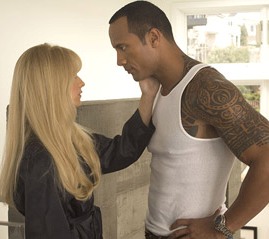 Finally, to kick off our story (which is apparently Part IV of a larger, presumably even more boring saga), we learn that an impressively-tattooed, Schwarzeneggerian movie star with top GOP connections (The Rock) has shown up in the middle of the desert suffering from amnesia, and has been taken under the wing of talk show hostess/porn star Krysta Now (Sarah Michelle Gellar) and her drug dealer roommate (Will Sasso). Got all that? We also discover along the way that the GOP and the Fluid Karma gurus (more on them in a second) might be in cahoots, that the NeoMarxist underground is basically run by former SNL alums (and poor, poor Avon Barksdale (Wood Harris) — guess he won’t be making fun of McNulty anymore for 300), that — paging Mr. Darko — there may be a time travel aspect to all of this, and that the secret to everything may rest on a pair of twin brothers (Seann William Scott), who find themselves getting drugged and/or knocked out a lot. Oh, and since JT keeps quoting Revelations over various scenes, its a solid presumption that the End of the World is more than likely on hand too…Bummer.
Finally, to kick off our story (which is apparently Part IV of a larger, presumably even more boring saga), we learn that an impressively-tattooed, Schwarzeneggerian movie star with top GOP connections (The Rock) has shown up in the middle of the desert suffering from amnesia, and has been taken under the wing of talk show hostess/porn star Krysta Now (Sarah Michelle Gellar) and her drug dealer roommate (Will Sasso). Got all that? We also discover along the way that the GOP and the Fluid Karma gurus (more on them in a second) might be in cahoots, that the NeoMarxist underground is basically run by former SNL alums (and poor, poor Avon Barksdale (Wood Harris) — guess he won’t be making fun of McNulty anymore for 300), that — paging Mr. Darko — there may be a time travel aspect to all of this, and that the secret to everything may rest on a pair of twin brothers (Seann William Scott), who find themselves getting drugged and/or knocked out a lot. Oh, and since JT keeps quoting Revelations over various scenes, its a solid presumption that the End of the World is more than likely on hand too…Bummer.
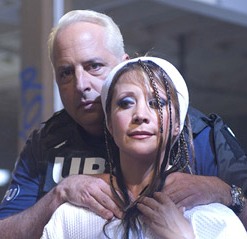 If this all sounds splendidly bizarre, well, it’s not. Southland Tales‘ strained attempts to come off as surreal might have worked if they had seemed effortless, but sadly they always feel here as if they required Herculean labor. Too much of the dialogue is drowning in exposition or weighed down by ponderous nods to Eliot, Frost, Revelations, etc. (I fear Kelly defenders will cite these to argue the film has hidden depths, when really they just expose how often Tales languishes in the shallows. But, admittedly, they might seem profound if you were completely baked out of your gourd.) Kelly has also clearly tried to give this project some weirdness cachet by dint of offbeat casting — the film is overloaded with C-grade celebrities and former ’80s icons. Case in point: Early in the film, we meet the team behind Fluid Karma, and they’re — I kid you not — composed of Wallace Shawn (best known for his “inconceivable” rants in The Princess Bride), Bai Ling, Zelda “Poltergeist” Rubenstein, Beth “Sparkle Motion” Grant, and Curtis “Booger” Armstrong. This sort of thing is good for a chuckle every so often, but after awhile — John Larroquette plays Karl Rove, Christopher Lambert drives an ice cream truck — it all just seems glommed on and irritating, particularly since Kelly seemingly expects the sheer presence of these people to do all the heavy lifting.
If this all sounds splendidly bizarre, well, it’s not. Southland Tales‘ strained attempts to come off as surreal might have worked if they had seemed effortless, but sadly they always feel here as if they required Herculean labor. Too much of the dialogue is drowning in exposition or weighed down by ponderous nods to Eliot, Frost, Revelations, etc. (I fear Kelly defenders will cite these to argue the film has hidden depths, when really they just expose how often Tales languishes in the shallows. But, admittedly, they might seem profound if you were completely baked out of your gourd.) Kelly has also clearly tried to give this project some weirdness cachet by dint of offbeat casting — the film is overloaded with C-grade celebrities and former ’80s icons. Case in point: Early in the film, we meet the team behind Fluid Karma, and they’re — I kid you not — composed of Wallace Shawn (best known for his “inconceivable” rants in The Princess Bride), Bai Ling, Zelda “Poltergeist” Rubenstein, Beth “Sparkle Motion” Grant, and Curtis “Booger” Armstrong. This sort of thing is good for a chuckle every so often, but after awhile — John Larroquette plays Karl Rove, Christopher Lambert drives an ice cream truck — it all just seems glommed on and irritating, particularly since Kelly seemingly expects the sheer presence of these people to do all the heavy lifting.
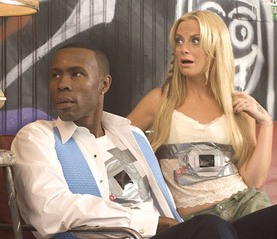 So what’s good about Southland Tales? Lordy, not much. As I said earlier, the satirical CNN of the near-future is well-constructed. The cast do what they can with what they’ve got, and most of ’em rise above the material: The Rock is charismatic enough to jet by, Seann William Scott at least seems like he’s trying, and Justin Timberlake redeems himself with one of the better scenes in the film, a lip-synched video to The Killers’ “All These Things That I’ve Done” (which nonetheless comes off as a Big Lebowski ripoff set to ski-ball, and mirrors quite closely the “Happiness is a Warm Gun” routine from Across the Universe earlier this year.) But these brief moments are by no means enough to recommend this dismal misfire of a film. Let me put it this way: I really liked the original version of Donnie Darko (note the rotating header), I really like cutting political satire and big-think sci-fi (for a classic example of how to do it right, see Brazil), I really like seeing semi-forgotten actors find work (see my post on Matt Frewer and Watchmen earlier this week) and I hated — hated — this film. You’d be hard pressed to find someone more likely to give Richard Kelly and Southland Tales a larger benefit of the doubt than I did going in, but this movie is rambling, incoherent, puerile, and, worst of all, tedious. Revelation 3:16: So then because thou art lukewarm, and neither cold nor hot, I will spue thee out of my mouth.
So what’s good about Southland Tales? Lordy, not much. As I said earlier, the satirical CNN of the near-future is well-constructed. The cast do what they can with what they’ve got, and most of ’em rise above the material: The Rock is charismatic enough to jet by, Seann William Scott at least seems like he’s trying, and Justin Timberlake redeems himself with one of the better scenes in the film, a lip-synched video to The Killers’ “All These Things That I’ve Done” (which nonetheless comes off as a Big Lebowski ripoff set to ski-ball, and mirrors quite closely the “Happiness is a Warm Gun” routine from Across the Universe earlier this year.) But these brief moments are by no means enough to recommend this dismal misfire of a film. Let me put it this way: I really liked the original version of Donnie Darko (note the rotating header), I really like cutting political satire and big-think sci-fi (for a classic example of how to do it right, see Brazil), I really like seeing semi-forgotten actors find work (see my post on Matt Frewer and Watchmen earlier this week) and I hated — hated — this film. You’d be hard pressed to find someone more likely to give Richard Kelly and Southland Tales a larger benefit of the doubt than I did going in, but this movie is rambling, incoherent, puerile, and, worst of all, tedious. Revelation 3:16: So then because thou art lukewarm, and neither cold nor hot, I will spue thee out of my mouth.

